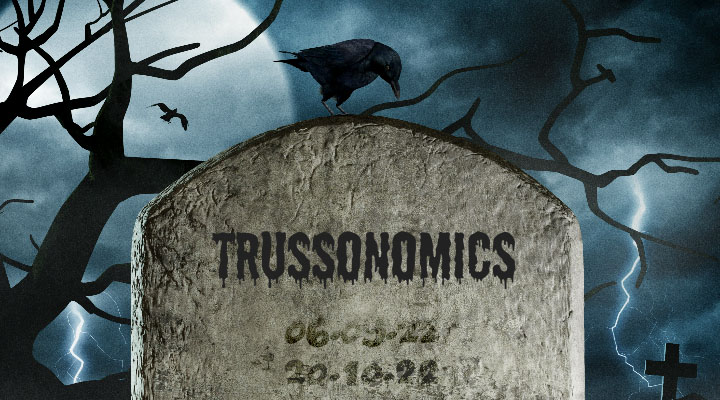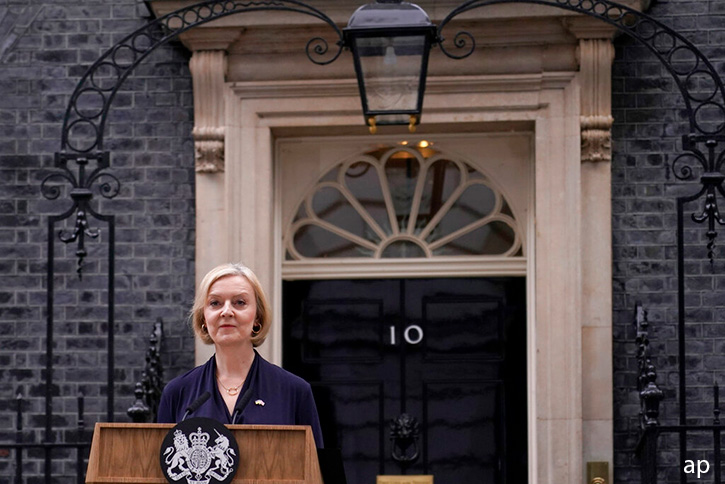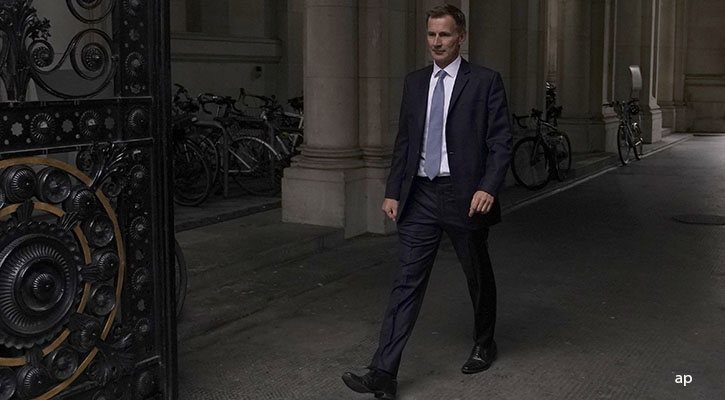
“Trussonomics” didn’t even sound right as a word so it’s no surprise it didn’t work in practice either.
With the prime minister resigning less than a month after the so-called mini-Budget, her brief government will be remembered for a set of bold and reckless tax policies that ended up in the bin.
In the end the “low tax, high growth” mantra didn’t mean anything, and the market sniffed that out and voted against it. Almost every policy introduced under that banner has been ditched after a massive backlash on all sides. Rarely has a government caused such turmoil in financial markets in such a short period of time.
Therefore, as Liz Truss and Kwasi Kwarteng fade into the background, we ask: what just happened – and will anything survive the implosion of both politicians? I look at some of the key takeaways from Truss’s 44-day outing as PM.
Bad Problems, Bad Ideas
Conservatives would like to believe that a new prime minister can now come in with a new set of economic policies and win an election against a resurgent Labour party.
At current polling levels, however, this looks very unlikely indeed. The party has been in power for more than 12 years and since the Boris Johnson era went south this year, has looked increasingly doomed. Voters are yet to have their say but markets appear to have already had theirs.
It now looks like the party has run out of economic ideas – and usually that means they’ve run out of time in office. The list of problems faced by the UK is daunting and hard to fix without pain on all sides: high inflation, ailing public services, strikes, a weak currency, the Brexit fallout, the hangover from pandemic spending, looming recession and a potential break with Scotland.
These problems require smart thinking and a long-term approach, but the Truss-Kwarteng double act had the wrong answers to each of these problems. Moreover, it appears both refused to accept this when they were told on multiple occasions by experienced advisers and civil servants.
One sign of how acute the quagmire is are markets, which are yet to be convinced that Britain’s ruling party has a credible plan to fix the mess. New chancellor Jeremy Hunt is now talking about making “eye-watering decisions,” and, though that seems to have provided short-term reassurance to investors that he is taking the situation seriously, that is not the same as restoring credibility.
Yields Matter
UK government bonds used to be a byword for predictability, offering low yields in exchange for the safety of owning a piece of the British state, which is known for its sound finances and for “economic stability” (Truss’s key phrase of the last few weeks).
Two years ago the 10-year gilt was flirting with a zero yield but has recently threatened to test 5%. Yes, central banks have been hiking rates across the world, inflation is at multi-decade highs in West, but the UK bond market in recent weeks have been giving off alarm signals that suggest this a country-specific issue too.
Reacting to the September 23 fiscal event, M&G’s fixed income guru Jim Leaviss, said “it’s fair to say the gilt market hated today’s mini-Budget.”
The general public don’t usually think about gilt yields but they have an immediate impact on mortgages: last year people could fix their home loans at 1% but are now being offered rates above 6%, a staggering and likely unaffordable increase for savers.
Gilts matter for other reasons: the government’s borrowing costs have soared and it now needs to pay more to investors for holding its debt. And that’s a serious problem for a party that wanted to reduce its tax take and get by on higher borrowing.
Baked into yields is what’s became known as a “moron premium”, a phrase attributed to Dario Perkins, a macro specialist at TS Lombard. Gilt yields are 75 to 100 basis points above where they should be because of the political chaos and poor leadership, experts estimate.
“If this is sustained this translates through to billions of pounds of public and private money paid to creditors/inward investors almost entirely unnecessarily,” says Panmure Gordon’s Simon French.
Pension Deficits
As well as shattering complacency over “safe” gilts, the market chaos also dragged UK pensions into the vortex. Final salary or defined contribution pensions were seen as “gold-plated” retirement funds because they guaranteed payouts to employees. But recently, they have had their own version of a financial crisis, though luckily it was averted by the Bank of England stepping in as the buyer of last resort. In the process we’ve all learned something new.
It turns out the UK pension funds were dabbling in derivatives via Liability Driven Investing (LDI), which triggered potentially ruinous margin calls – and a “doom loop” for bonds, where prices kept falling amid continuous selling. I explain more about this in my article “Why Are Pension Funds Under Stress?”
The central bank time limited its support for the sector, effectively telling pension funds to get their house in order and shore up their liquidity. This crisis appears to have passed, and bar some confusing messaging from the Bank Governor Andrew Bailey, seems to have strengthened the Bank’s credibility in the medium-term; in any case, it’s come out of the storm in better shape than the government.
Its executive director for markets, Andrew Hauser, described this period in early October as a “full-scale liquidation event” for pension funds. Coming from a Bank official, this is serious talk indeed.
One of the UK’s biggest listed pension companies, Legal & General, told the market in October it is working with clients “to achieve appropriate hedging levels in their portfolios”. This sounds like a complete rethink of risk management tools is coming in the sector; expect more details on the fallout from the LDI crisis as these companies start reporting.
For their part, investors and regulators will now take a closer look at how pension funds actually work and whether they are being careful enough with retirees’ savings.
Where Next?
Post-Brexit, the UK was supposed to become “Singapore-on-Thames”, a thriving hi-tech, low-tax, low-regulation innovation hub. Given the current dire political and economic landscape, most Britons will settle for something less than this Utopia. In the worst times, a government that can’t significantly improve the situation should at the very least not make things any worse than they already are.
UK assets may have rallied on the Truss announcement on Thursday but there’s still no credible way forward: DBRS Morningstar is still worried about “the absence of clarity on the UK’s fiscal plans”. The new chancellor will outline more details on October 31, accompanied by forecasts from the independent Office for Budget Responsibility.
He has already warned of coming financial pain to come, revisited fiscal conservatism, and backed wealth distribution “out of the pockets of those rich bankers” – a potentially more populist idea than giving multi-millionaires a tax cut. Whether the Conservatives can rescue their reputation from the autumn chaos remains to seen, however. To be honest it seems quite unlikely. We await more news.




























